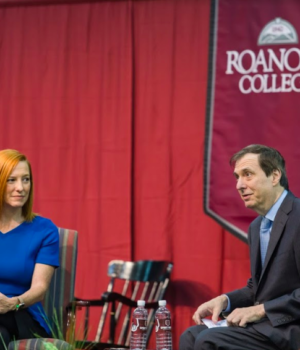Written by Bradley Bommarito
On Tuesday, Nov. 12, RC hosted the Henry H. Fowler Distinguished Public Speaker Program’s 2019 program, which was titled, “Can We Talk? Civil Discourse and Democracy: Howard Kurtz in Conversation with Jen Psaki.” An eager audience of students, faculty, and community members packed into Bast for the 7:30 p.m. event.
Kurtz and Psaki, both media contributors for two of the major networks, discussed the present breakdown in civil discourse and tried to pin down what led to the sad state of civil discourse today. They generally agree that the increasing presence of political advertising, campaigning, and posting activity on social media has contributed to hyperpolarization and the decline of civility in these matters.
“What has led to a lack of civility or challenge in discourse? I’d say Facebook and Twitter are a big part of that,” said Psaki.
Twitter can be especially ruthless when it comes to politics, as users have only 280 characters with which to express their opinion in a single Tweet. Additionally, politicians stir up both support and derision on this platform with Tweets that are purposefully written to be bold and inflammatory. Twitter battles between politicians are no longer an uncommon occurrence.
The rapid decline of local journalism coupled with widespread distrust in major media outlets has accelerated the breakdown in civil discourse. Tensions between President Trump and the media have fueled this distrust, as both parties constantly accuse each other of lying. The Trump administration has taken an unprecedentedly negative stance toward journalists, targeting those who publicly fact-check him and directing his staff to hold press conferences less frequently and for shorter durations.
The changing face of media itself has played a role. Many consumers prefer to get their news and commentary from social media platforms now, which are home to untrustworthy “alternative” news sources and pundits who grow their audience by making controversial claims and digitally attacking those they disagree with.
“It’s become so polarized out there, and there’s such a demonization of the other side,” said Kurtz.
Many users do not check the accuracy of a news article before sharing it, which can cause fake news to spread like wildfire before anyone realizes what happened. This happened in the 2016 election when several libelous articles about Hillary Clinton were shared in the week leading up to Election Day. Many believe this incident was impactful enough to change the outcome of the election.
Social media pundits and commentators earn advertising revenue from clicks on their posts, videos, and websites. The more engagement they draw, positive or negative, the more money the make.
As a result, many public figures feel incentivized to be as incendiary as possible in their online presence. Commentators who take a middle ground stance or refuse to engage in the chaos may become overshadowed by those who twist conflict and outrage to their advantage.
Is civil discourse dead? RC seems isolated from this partisan divide at times, as there is a noticeable lack of public displays of political affiliations. Many students prefer to avoid the topic entirely, and some engage only when they believe a productive conversation can occur.
“My experience with conversing with people who have differing political views than me has been minimal. As someone who strongly dislikes confrontation, I tend to shy away from conversations in which I know that I will get into arguments. However, I still hold a strong opinion about topics and, when prompted, will have conversations about my viewpoints. I believe everyone has a right to express their opinions and I try to keep that in mind when I do not agree with someone else’s views,” said junior Tara Hrdlick.
According to the RC events website, “Howard Kurtz is a Fox News media critic and best-selling author who presents a non-partisan look at how today’s rapidly changing news and political landscape is evolving. He addresses faith in the media, truth in reporting, and the rapid-fire news cycle.”
Jen Psaki is a CNN contributor and a fellow at the Georgetown Institute of Politics where she teaches a course titled, “The Art of Communicating in a Social Media Age: The Good, The Bad and The Unknown.” She was the Communications Director for the Obama Administration.




